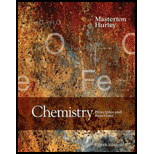
Write a chemical equation for an equilibrium system that would lead to the following expressions
(a)
(a)
Interpretation:
For the given expression of equilibrium constant, the equation for the equilibrium reaction needs to be determined.
Concept introduction:
The system is said to be in equilibrium if the there is no change in the partial pressure or concentration of reactant and product takes place.
For a general reaction as follows:
The expression for the equilibrium constant is represented as follows:
Here, to calculate the equilibrium constant, the values of partial pressure of all the species in reactant and product side are required.
Answer to Problem 12QAP
Explanation of Solution
The given expression for the equilibrium constant, K is as follows:
Here,
The equation for the equilibrium system will be:
(b)
Interpretation:
For the given expression of equilibrium constant, the equation for the equilibrium reaction needs to be determined.
Concept introduction:
The system is said to be in equilibrium if the there is no change in the partial pressure or concentration of reactant and product takes place.
For a general reaction as follows:
The expression for the equilibrium constant is represented as follows:
Here, to calculate the equilibrium constant, the values of partial pressure of all the species in reactant and product side are required.
Answer to Problem 12QAP
Explanation of Solution
The given expression for the equilibrium constant, K is as follows:
Here,
The equation for the equilibrium system will be:
Or,
(c)
Interpretation:
For the given expression of equilibrium constant, the equation for the equilibrium reaction needs to be determined.
Concept introduction:
The system is said to be in equilibrium if the there is no change in the partial pressure or concentration of reactant and product takes place.
For a general reaction as follows:
The expression for the equilibrium constant is represented as follows:
Here, to calculate the equilibrium constant, the values of partial pressure of all the species in reactant and product side are required.
Answer to Problem 12QAP
Explanation of Solution
The given expression for the equilibrium constant, K is as follows:
Here,
The equation for the equilibrium system will be:
To balance the above reaction:
(d)
Interpretation:
For the given expression of equilibrium constant, the equation for the equilibrium reaction needs to be determined.
Concept introduction:
The system is said to be in equilibrium if the there is no change in the partial pressure or concentration of reactant and product takes place.
For a general reaction as follows:
The expression for the equilibrium constant is represented as follows:
Here, to calculate the equilibrium constant, the values of partial pressure of all the species in reactant and product side are required.
Answer to Problem 12QAP
Explanation of Solution
The given expression for the equilibrium constant, K is as follows:
Here,
The equation for the equilibrium system will be:
To balance the above reaction:
Want to see more full solutions like this?
Chapter 12 Solutions
Chemistry: Principles and Reactions
- Show that the complete chemical equation, the total ionic equation, and the net ionic equation for the reaction represented by the equation KI(aq)+I2(aq)KI3(aq) give the same expression for the reaction quotient. KI3 is composed of the ions K+ and I3-.arrow_forwardWrite an equation for an equilibrium system that would lead to the following expressions (ac) for K. (a) K=(Pco)2 (PH2)5(PC2H6)(PH2O)2 (b) K=(PNH3)4 (PO2)5(PNO)4 (PH2O)6 (c) K=[ ClO3 ]2 [ Mn2+ ]2(Pcl2)[ MNO4 ]2 [ H+ ]4 ; liquid water is a productarrow_forwardWrite the expression for the equilibrium constant and calculate the partial pressure of CO2(g), given that Kp is 0.25 (at 427 C) for NaHCO3(s) NaOH(s) + CO2(g)arrow_forward
- At a certain temperature, K=0.29 for the decomposition of two moles of iodine trichloride, ICl3(s), to chlorine and iodine gases. The partial pressure of chlorine gas at equilibrium is three times that of iodine gas. What are the partial pressures of iodine and chlorine at equilibrium?arrow_forwardIn a solution with carbon tetrachloride as the solvent, the compound VCl4. undergoes dimerization: 2VCl4V2Cl8 When 6.6834 g VCl4. is dissolved in 100.0 g carbon tetrachloride, the freezing point is lowered by 5.97C. Calculate the value of the equilibrium constant for the dimerization of VCl4 at this temperature. (The density of the equilibrium mixture is 1.696 g/cm3, and Kf = 29.8C kg/mol for CCl4.)arrow_forwardFor the reaction N2(g)+3H2(g)2NH3(g) show that Kc = Kp(RT)2 Do not use the formula Kp = Kc(RT)5n given in the text. Start from the fact that Pi = [i]RT, where Pi is the partial pressure of substance i and [i] is its molar concentration. Substitute into Kc.arrow_forward
- The decomposition of PCl5(g) to form PCl3(g) and Cl2(g) has Kc = 33.3 at a high temperature. If the initial concentration of PCl5 is 0.1000 M, what are the equilibrium concentrations of the reactants and products?arrow_forwardSuppose a reaction has the equilibrium constant K = 1.3 108. What does the magnitude of this constant tell you about the relative concentrations of products and reactants that will be present once equilibrium is reached? Is this reaction likely to be a good source of the products?arrow_forward
 Chemistry: Principles and ReactionsChemistryISBN:9781305079373Author:William L. Masterton, Cecile N. HurleyPublisher:Cengage Learning
Chemistry: Principles and ReactionsChemistryISBN:9781305079373Author:William L. Masterton, Cecile N. HurleyPublisher:Cengage Learning Chemistry: The Molecular ScienceChemistryISBN:9781285199047Author:John W. Moore, Conrad L. StanitskiPublisher:Cengage Learning
Chemistry: The Molecular ScienceChemistryISBN:9781285199047Author:John W. Moore, Conrad L. StanitskiPublisher:Cengage Learning Chemistry: Principles and PracticeChemistryISBN:9780534420123Author:Daniel L. Reger, Scott R. Goode, David W. Ball, Edward MercerPublisher:Cengage Learning
Chemistry: Principles and PracticeChemistryISBN:9780534420123Author:Daniel L. Reger, Scott R. Goode, David W. Ball, Edward MercerPublisher:Cengage Learning Physical ChemistryChemistryISBN:9781133958437Author:Ball, David W. (david Warren), BAER, TomasPublisher:Wadsworth Cengage Learning,
Physical ChemistryChemistryISBN:9781133958437Author:Ball, David W. (david Warren), BAER, TomasPublisher:Wadsworth Cengage Learning, Principles of Modern ChemistryChemistryISBN:9781305079113Author:David W. Oxtoby, H. Pat Gillis, Laurie J. ButlerPublisher:Cengage Learning
Principles of Modern ChemistryChemistryISBN:9781305079113Author:David W. Oxtoby, H. Pat Gillis, Laurie J. ButlerPublisher:Cengage Learning Chemistry by OpenStax (2015-05-04)ChemistryISBN:9781938168390Author:Klaus Theopold, Richard H Langley, Paul Flowers, William R. Robinson, Mark BlaserPublisher:OpenStax
Chemistry by OpenStax (2015-05-04)ChemistryISBN:9781938168390Author:Klaus Theopold, Richard H Langley, Paul Flowers, William R. Robinson, Mark BlaserPublisher:OpenStax





